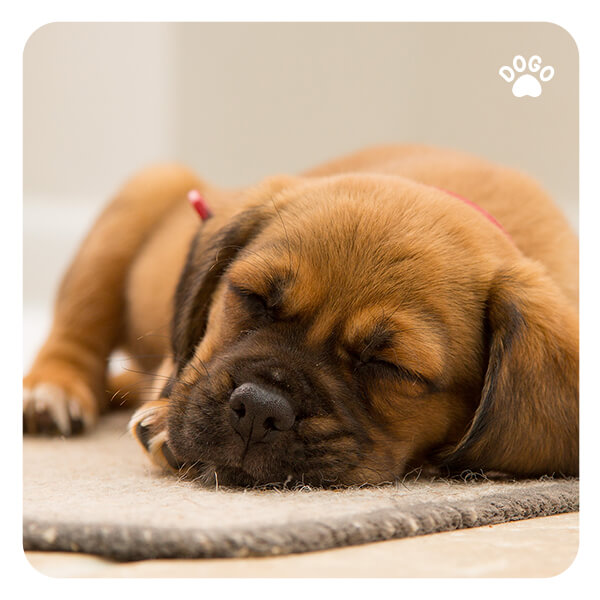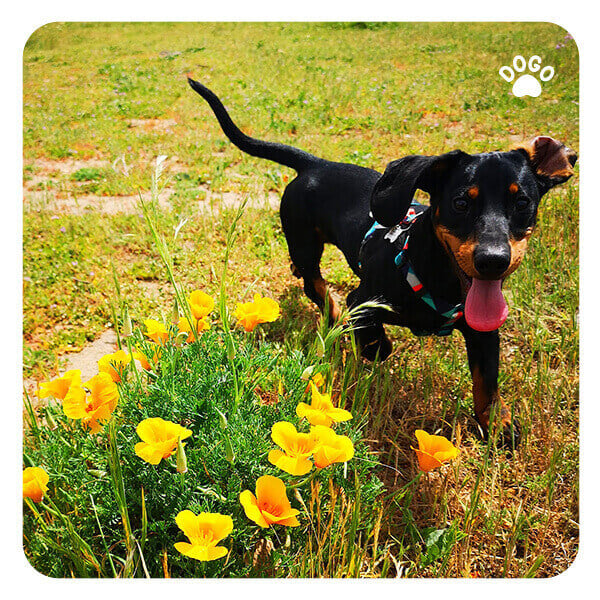5 Important Things You Should Teach Your Puppy ASAP
Post Date:
October 24, 2023
(Date Last Modified: November 13, 2025)
Puppies are highly receptive to early learning and benefit from consistent guidance that shapes daily habits, social behavior, and safety skills.
Potty Training
Establish a predictable schedule and a clear cue word so your puppy learns where and when elimination is expected. Puppies younger than 6 months often need an opportunity to eliminate every 2–4 hours during daytime housetraining; plan outings and crate breaks to match that rhythm [1].
Use a single short cue (for example, “go potty”) delivered calmly as the puppy starts sniffing or squatting; reward within 1–2 seconds after the behavior to strengthen the association [1]. When using crate-assisted timing, take the puppy out immediately on crate release and to the same spot so scent and routine add predictability. If an accident happens indoors, clean with an enzymatic cleanser and avoid punishment; instead, shorten the interval between trips and increase supervision until reliability improves [1].
Crate Training
Make the crate a safe den by introducing it gradually: leave the door open, place soft bedding and treats inside, and use short, positive entries and exits so the puppy chooses the crate willingly. Limit unsupervised crate time to protect bladder control and welfare; as a guideline, young puppies generally should not be crated for longer than 3–4 hours at a stretch during the day [2].
Choose an appropriately sized crate that allows the puppy to stand, turn, and lie down comfortably; use dividers if you are buying a crate for growth so the usable space is tailored over time [2]. Establish a consistent bedtime routine (quiet bathroom visit, brief calm play, then crate with a safe chew) and practice short, calm car rides in the crate to make travel less stressful [2].
Recall (Come)
Begin recall by pairing the puppy’s name and the cue “come” with consistently high‑value rewards so the cue predicts something very good; immediate reinforcement is key, with food or play delivered within 1–2 seconds of arrival [3].
Start at very short distances and add distractions and distance gradually: practice three to five short recalls per session for 5–10 minutes total, then increase complexity across days [3]. When proofing recall, use a long line in safe areas to allow the puppy freedom while keeping control, and progress to off‑leash only after consistent, reliable returns in increasingly challenging contexts [3].
Bite Inhibition & Mouthing
Teach gentle mouth pressure by redirecting teeth onto appropriate chew toys and signaling when pressure is too hard; a sharp “ouch” or brief withdrawal of attention after a painful nip communicates the social cost of hard bites. Short time-outs of about 30–60 seconds help the puppy associate nipping with the end of fun and can reduce escalation of mouthing [4].
Reward calm play and soft mouths with attention and treats immediately so the puppy learns that quiet contact earns rewards. When puppies socialize with littermates or other puppies, allow them to calibrate bite pressure naturally under supervision, stepping in with redirection when play becomes too rough [4].
Basic Commands (Sit, Down, Stay)
Short, frequent training sessions are more effective than longer, infrequent sessions; aim for multiple 3–5 minute sessions spread through the day for young puppies to maintain focus and build foundations [5].
Use shaping (rewarding successive approximations) in combination with luring as appropriate so the puppy offers behaviors willingly; once a behavior is shaped, add clear one‑word cues and gradually increase duration and distance before proofing with distractions [5].
| Skill | Session length | Repetitions/day | Progress goal |
|---|---|---|---|
| Recall | 3–5 minutes | 3–5 | Reliable 10–20 ft |
| Sit | 2–4 minutes | 4–6 | Cue on first prompt |
| Down | 3–5 minutes | 3–5 | Hold 10+ seconds |
| Stay | 2–5 minutes | 2–4 | Increase distance & duration |
Leash Manners
Train loose-leash walking with techniques such as stop‑and‑go and marker/reward pairing; begin with short 5–10 minute practice walks indoors or in a quiet yard to shape attention to the handler before increasing duration and environmental challenge [5].
Consider a front‑clip harness for puppies that pull so handlers can shape better posture without pressure on the neck; transition decisions should be individualized based on breed, size, and any medical advice from your veterinarian [5]. Desensitize passing dogs by keeping distance initially and rewarding calm attention; gradually decrease distance only when the puppy remains relaxed and responsive.
Socialization
Expose the puppy to a variety of people, animals, surfaces, and sounds during the early sensitive period using controlled, positive experiences; structured puppy classes and supervised playdates are practical ways to offer safe, progressive exposures. For vaccination‑related planning, follow veterinary guidance that balances disease risk with the need for social exposure, and favor controlled, low‑risk settings until full vaccination is advised by your veterinarian [3].
- Introduce different ages and sizes of people calmly
- Offer varied surfaces (carpet, tile, pavement, grass) and sounds at low volume
- Use short, positive meet-and-greets with other vaccinated, friendly dogs
Make most first exposures short and positive so the puppy builds confident memories; if a puppy shows fear, reduce intensity, increase distance, and pair the experience with valued rewards to create a safe learning slope [3].
Handling & Grooming Habituation
Practice gentle handling of paws, ears, teeth, and coat for a few minutes several times per day so veterinary exams and grooming become routine and less stressful later; start with light touches paired with treats and praise, gradually increasing duration and firmness as the puppy accepts handling [2].
Include short mock exams (lift paws, open mouth, check ears) and brief grooming sessions such as gentle brushing or towel drying; if the puppy tolerates nail touches, follow with a reward immediately to reinforce calm behavior [2]. Regular, positive exposure reduces fear responses at the clinic or groomer later in life.
Impulse Control: “Leave It” & “Drop It”
Teach “leave it” stepwise, starting with low‑value items and rewarding the puppy for orienting away; once reliable, progress to higher‑value items and add distance and duration to proof the behavior in real environments [4].
For “drop it,” practice trading a held item for a higher‑value treat so the puppy learns releasing behavior earns something better; repeat short, calm drills in multiple rooms and around mild distractions before expecting success in public spaces [4]. Avoid forcibly removing items, which can create guarding; use controlled trading and redirection instead.
Consistent, positive training delivered in short daily sessions and integrated into routine care helps puppies generalize good behavior across people, places, and situations.
Troubleshooting common setbacks
If accidents recur, temporarily shorten the interval between outdoor trips to every 1–2 hours during daytime until the puppy shows consistent success; increase supervision and tethering indoors to reduce unsupervised roaming [1]. When crate aversion appears, scale back to very short contained sessions of 5–10 minutes with high‑value treats and then slowly increase duration by no more than 10–20% per day to rebuild positive associations [2].
Age-based expectations and pacing
Puppies under 4 months often have limited bladder and bowel control and may need more frequent toilet breaks than older juveniles; as a working guideline, many veterinarians recommend limiting daytime unsupervised confinement to about 3–4 hours for young puppies, with longer nighttime sleep periods of up to 6–8 hours once reliably housetrained [2].
The socialization sensitive window commonly cited for positive exposure spans roughly 3–14 weeks of age, so prioritize varied, calm experiences early and thread ongoing experiences through months 3–16 to maintain confidence while preventing fear generalization [4].
Reward selection, timing, and calorie management
Use small, easily consumed rewards so the puppy can eat and return to work quickly; for food-motivated puppies, 1–2 small kibble pieces or pea-sized soft treats per repetition keeps sessions efficient. When training accounts for a portion of daily calories, reduce meal portions so that treats do not exceed roughly 10–20% of daily intake unless advised otherwise by your veterinarian [5].
Deliver rewards within 1–2 seconds of the desired behavior to strengthen learning; delays of more than 3–4 seconds make it harder for puppies to connect action and outcome, so use a marker (clicker or verbal marker) to bridge short delays when necessary [5].
Managing distractions and proofing behaviors
Progress proofing by adding one variable at a time: increase distance, then duration, then mild distractions, then stronger distractions; expect that each step may take several days to weeks depending on the individual puppy and the environment [3].
Use a long line (15–30 ft / 4.5–9 m) for safe extension of recall and “leave it” practice so the puppy experiences distance without full off‑leash risk; combine long‑line practice with high‑value rewards and repeatable short sessions to build reliability [3].
Safe socialization around health considerations
Coordinate early socialization with your veterinarian: in many practices, limited, controlled social exposure to fully vaccinated adults and vaccinated puppies can begin before the final core vaccine series is complete, provided the setting reduces infectious risk and direct contact is supervised [3]. When disease risk is a concern in your area, prioritize low‑contact exposures such as handling by different people, car rides, and outdoor surface exploration until vaccination is complete [3].
Building calmness and emotional control
Train impulse control by inserting brief pauses in play and rewarding the puppy for sitting calmly for 3–10 seconds before resuming; gradually increase the calm duration so the dog learns that restraint earns engagement rather than loss of fun [4].
Use predictable daily routines—mealtimes, walks, play, training, and rest—to reduce anxiety and make behavioral expectations clearer; many puppies respond to consistent timing by showing fewer arousal spikes and faster learning progress [5].
When to seek professional help
If aggressive reactions, extreme fear, or repetitive problem behaviors persist beyond reasonable training efforts, consult a veterinarian or a certified applied animal behaviorist; referral should be considered when behaviors cause safety concerns or do not meaningfully improve after 2–4 weeks of focused, consistent interventions [2].
For medical causes of behavior change—sudden house soiling, abrupt onset of aggression, or dramatic shifts in activity—obtain a veterinary exam promptly to rule out pain, infection, or neurologic conditions before intensifying behavioral plans [2].
Consistent, short training sessions, positive reinforcement, and careful timing of social exposures create a foundation of safety and cooperation; prioritize early wins, monitor progress with realistic timeframes, and partner with veterinary and behavior professionals when challenges escalate.






